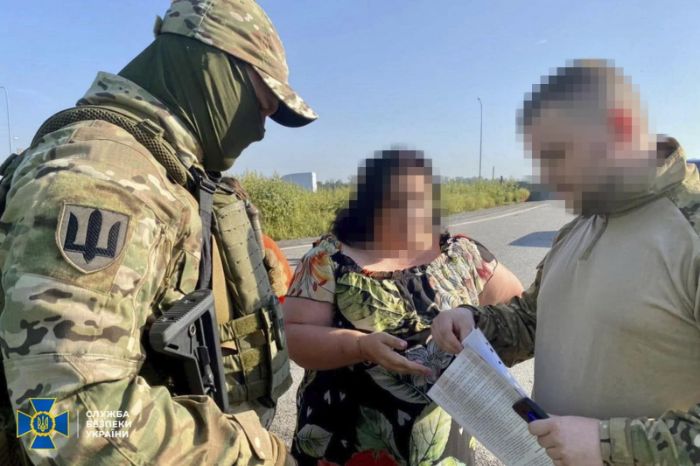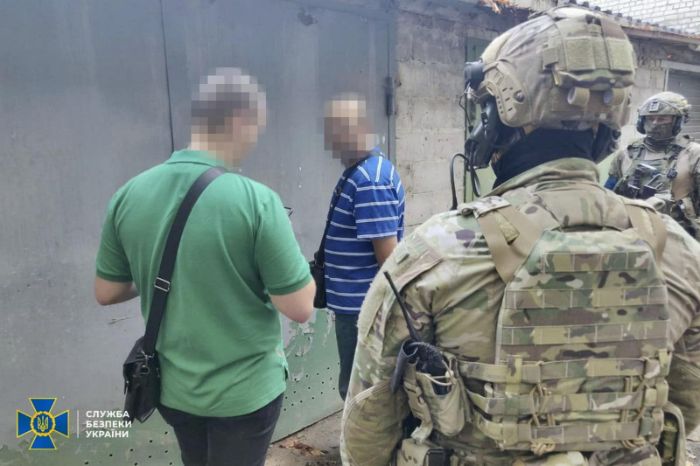On August 29, 2022, in Kharkiv, the Security Service of Ukraine (SBU) officers detained entrepreneur Natalia Biliyenko and Yuriy Mazharov, an electrician for “Kharkivoblenergo.” They were charged under Part 2, Article 111 of the Ukrainian Criminal Code (treason during wartime) for providing Russian representatives with data on the location of the Ukrainian Armed Forces (UAF) in the Kharkiv region. On January 16, 2024, both received 15-year sentences with confiscation of property.
The investigation believes that between February 24 and 27, 2022, Natalia Biliyenko, “under unspecified circumstances of time and place,” contacted a commander of a reconnaissance unit of the 2nd Separate Guards Motor Rifle Brigade of the 2nd Army Corps of the LNR People’s Militia (NM) and received instructions to gather data on the UAF’s deployment in the Kharkiv region.
Then, also “under unspecified circumstances of time and place,” she offered Yuriy Mazharov assistance in collecting the data. Mazharov had personal reasons to agree—he was resentful towards Ukrainian soldiers who, in early March 2022, had unjustly detained him, his wife, and mother while they were traveling through the city, opened fire on them, and forced them to lie on the ground.
It is believed that during March, Mazharov several times recorded the presence of UAF units in a shopping mall in Kharkiv, but no Russian missiles struck that location. Furthermore, in the correspondence between Biliyenko and the military official discovered by the SBU, there is no mention of tasks or agreement to carry them out.
Judging by the case materials, the SBU was aware of the events as early as June, as information about the crime was entered into the Unified Register of Pre-Trial Investigations (UERI) on June 4. However, no searches or detentions followed.

The court revealed that the LNR serviceman with whom Natalia communicated was her former husband, who served in the Ukrainian police until 2014, and then in the LNR NM. After February 24, 2022, they communicated about their shared daughter and granddaughter. Natalia claims he gave her no instructions, and this seems to be true.
On July 1, 2022—prior to Bilienko’s arrest and phone seizure—the SBU obtained her Telegram correspondence with her ex-husband, likely through covert telecom surveillance (such interception requires special judicial authorization, absent from case materials). The exchange read:
— “How could we help ‘our people’ here?”
— “We’re already doing enough.”
— “I want to speed things up.”
— “They’ll come soon. They’re waiting.”
— “Well, so are we.”
— “Just wait.”
This text clearly shows Natalia’s support for Russia in the conflict, but this alone is not a crime under Ukrainian law, and there is no mention of transmitting any data.
The SBU obtained data on a second correspondence on August 5, 2022. The text is as follows:
— When will ours arrive?
— They said 2-3 days and they’ll be in Pechenehy.
— I’ll be driving around and keeping an eye out.
Pechenehy is a village in the Kharkiv region, occupied by the Russian army at the very beginning of the special military operation (SMO). On February 24, Ukraine blew up a dam across the Siversky Donets River to halt the Russian advance. On April 18, the Russian Armed Forces left the village. This means the correspondence with her ex-husband took place almost on the first day of the SMO (most likely, on the very first day). Again, there are no instructions, only the expectation of “ours.”
It also turns out that the SBU learned about this correspondence a month after entering data about the crime into the UERI. It can be assumed that Mazharov was noticed collecting data in the shopping mall, perhaps in late March. But why wasn’t he detained? Perhaps they were gathering evidence of receiving and fulfilling the task. However, as we see, there is no such evidence in the correspondence obtained on July 1. “Waiting for ours” is, of course, a reason for the SBU to take a closer look at a person, but such a crime does not exist in the Ukrainian Criminal Code.
On May 21, Natalia received a call from her ex-husband’s current wife informing her of his death.
Ideally, the investigation should have ended there. The case could have been closed due to lack of evidence, or Mazharov could have been charged for his trips to the shopping mall, claiming he collected information for Russia and hoping the court wouldn’t investigate too deeply.
But something else happened.
Almost a month later, on June 15, Biliyenko was contacted by someone the investigation later identified as the deputy commander of the 11th Battalion of a separate guards motor rifle brigade of the LNR army corps and simultaneously an employee of the GRU (Main Intelligence Directorate of the General Staff of the Armed Forces of the Russian Federation). The evidence confirming this person’s positions is unknown. While Natalia naturally knew her ex-husband and confirmed his identity in court, she knew nothing about the second communicator’s identity. It was assumed he was from Russia, but there was no specifics. The correspondence confirms this.
The unknown person asked Natalia to provide him with information about Kharkiv (her ex-husband, as we remember, did not ask for this, and the correspondence with him did not lead to an arrest). “We’re interested in the locations and movements of military equipment, especially artillery. Ideally, information about Western aid would be useful. Locations of the permanent presence of nationalist battalions and foreign mercenaries,” the unknown person wrote. Natalia promised to find out but said she was not currently in Kharkiv and would only return after some time. “That’s too long,” they replied. “We are planning a large-scale operation to enter and clear Kharkiv very soon. We can’t lose a day. Do you have a reliable person you trust who could handle this while you’re away?”

The SBU received information on July 1 about subsequent phone calls on June 16 and 24, in which Natalia allegedly told the “GRU officer” about equipment that was supposedly to be brought to Kharkiv in a few days and which “would strike your targets through some kind of satellite.” However, the woman was not detained. The SBU learned about the correspondence about the “large-scale operation to clear Kharkiv,” which clearly contained an assignment, on August 9, but again, neither Biliyenko nor Mazharov were detained.
There are also questions about the content of the correspondence. The “Battle for Kharkiv” ended in May, long before the “GRU officer” contacted Natalia.
As early as May 8th, the Russian Armed Forces abandoned a number of villages north of Kharkiv, and by the middle of the month, assault attempts ceased. Yes, in late July, Russian forces made an unsuccessful attempt to attack towards Kharkiv – northwest of Izyum – but this was much later than the recorded correspondence, almost a month and a half later. There can be no talk of any “in the very near future” here. In any case, a large-scale operation to enter Kharkiv at that time would have been impossible. In early September 2022, Ukraine regained control of the Kharkiv region.
That is, the “GRU officer” lied, because for some reason he really needed Natalia to commit a crime in the very near future. And yes, after June 15th, there is a qualitative leap in information gathering. There are no more incomprehensible trips to the shopping mall. From July 15th to August 28th, Mazharov visited several dozen locations where, according to the investigation, units and equipment of the Armed Forces of Ukraine were located.
But there’s another oddity.
“Under unknown circumstances of time and place,” but no later than July 18, 2022, Biliyenko contacted “unidentified persons among the residents of Kharkiv and the Kharkiv region,” who, by August 15th, had gathered data for her on the location of the Armed Forces of Ukraine on a section of the ring road near the Rogan residential area, in the village of Skrypai, Zmiivska territorial community, one of the factories in the region, and several other places. The most interesting thing is Natalia’s receipt on August 15th from “unidentified residents” of information about the SBU’s conducting filtration and stabilization measures in the village of Skrypai to identify “collaborators.” In other words, information that SBU officers were going around local residents, looking for those who, in their opinion, sympathized with Russia, and making arrests. They did this and continue to do so in all settlements from which Russian troops withdrew, and this fact is not a secret. But the most surprising thing is that after this, the “GRU officer” gave Natalia “an additional task” to collect “detailed information about SBU officers stationed in the specified settlement.” It can be assumed that some local residents photographed the positions of the Armed Forces of Ukraine in their region, but how they could find out detailed information about professional intelligence officers is a mystery.
The solution lies in the fact that nobody found out anything. On August 29th, the SBU detained Natalia and Yuriy. In early 2024, Natalia and Yuriy received 15 years of imprisonment with confiscation, although the questions remained unanswered.
It is unclear how the SBU, shortly before contacting Natalia’s second “representative of Russia,” learned that this would even happen and opened a criminal case, if her previous contacts with her ex-husband were revealed much later? The actions of the accused in March are unclear, since the case files show that Natalia communicated with her ex-husband (a soldier of the LNR army), but there is no indication that he gave her any assignments. It is unclear why Natalia and Yuriy were allowed to collect and transmit so much information and were not detained at least after the first recorded instance of transmission. The essence of the task of collecting data on SBU officers, which was never completed, is unclear. Who are the “unidentified residents” who were supposed to collect the information, and why were their identities not established? The argument regarding the fantastic assault on Kharkiv that was supposedly imminent is unclear.
Everything concerning the unexpectedly appearing nameless “GRU officer” after the death of Natalia’s ex-husband shows signs of the provocation of a crime – mere communication with her ex-husband, who served in the LNR army, could not have been, and was not, qualified as treason. The Biliyenko and Mazharov case undoubtedly requires a thorough review for provocation by the SBU of individuals oppositionally minded towards the Ukrainian authorities, since criminal prosecution for views and opinions is prohibited, and the crime would not have been committed if it had not been provoked.
This translation was made using a neural network. If you find any inaccuracies, please contact us.


